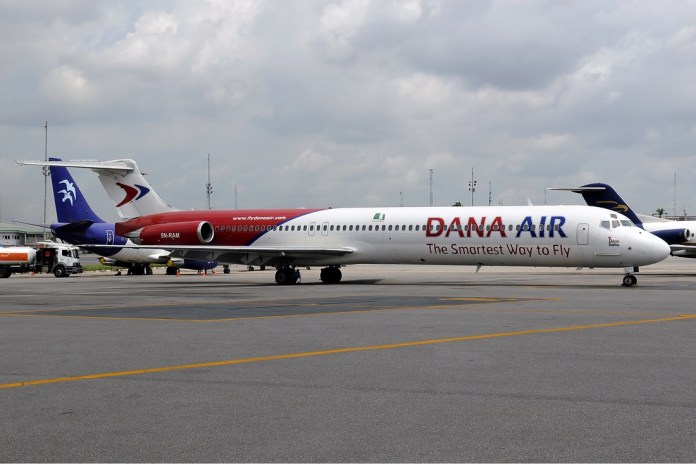- DANA flies 2.7 Million Passengers in Nine Years
DANA Air has flown over 2.7 million passengers in the past nine years, its Chief Operating Officer/Accountable Manager, Obi Mbanuzuo, has said.
He disclosed this while reviewing the operations of the airline since inception in 2008.
The airline said it has grappled with a myriad of operational challenges in the last nine years in its bid to contribute to the growth of air transport in Nigeria.
Speaking in an interview in Lagos, Mbanuzuo called on government to improve airport facilities and consolidate on the ease of doing business, which he said had improved passengers’ travel experience.
He said DANA Air would continue to take steps to improve industry growth through the recruitment and training of indigenous pilots. Mbanuzuo said: “Our commitment to supporting our own, while still encouraging professionalism and growth in the Nigerian aviation industry, has led to our recruitment and constant training of Nigerian pilots. We are proud of our contribution to the industry and we thank the regulators for being supportive of our efforts in this regard.
“We also took our safety standards a notch higher with our membership of the International Air Transport Association and as it affects statistics from the regulators and considering the number of flights we operate daily, we have not disappointed our guests. Our goal isn’t to improve on what has been achieved, but to totally reimagine it.
“In terms of customer satisfaction, we have raised the bar of our customer service with our newly introduced unit – The Special Service Unit, made up of highly trained staff to attend to urgent needs of our guests on ground in Lagos, Abuja and Uyo airports. And for our digital guests who love to avoid the queues, our self check-in kioks at MMA2, the first of its kind at the terminal is serving their purpose.
“We are also taking our guests the ‘cashless way’ with our ‘pay with Dana Miles’ initiative and we have created multiple channels for our guests to be able to reach and interact with us daily.”
On expansion plans, he said DANA Air after a rigorous audit was selected for an airline partnership with the Imo State Government to provide jobs for the people of the state, boost commercial activities and diversify the economy of the state.
He said: “Only our commitment towards maintaining our operational efficiency could have given us the edge for such partnership and we have commenced strategic plans to cover even more eastern routes, while strengthening and providing options in our expansion drive to other parts of the country.
“This is also part of the desire of the Imo State Government, to open the Eastern part of Nigeria; to further business opportunities, connectivity and maintain its position as the commercial hub of Nigeria.
“We once again thank our guests for finding us worthy of nomination for our numerous Airline of the Year awards, our unveiling as one of Nigeria’s 100 most respected companies, one of Nigeria’s top 50 brands for the second time consecutively and 4th consecutive Best Customer Service airline at the Nigerian Customer Service Awards.
“We avail this opportunity to wish ourselves many more years in the aviation industry and our desire is to see an aviation industry devoid of the multiple issues that airlines have to grapple with, and improved airport facilities.
“We commend the efforts President Muhmmadu Buhari led administration, the Minister of Aviation, Captain Hadi Sirika, and the regulators for their commitment towards the ease of doing business and we hope that these efforts are sustained.
“We also thank our guests for their patronage, support and loyalty. We shall be giving out 900 free return tickets, upgrade to Gold membership for our Dana Miles Silver members and loads of surprise packages to our guests for being wonderful as well.
“Our vision is to be recognized and respected as Nigeria’s most reliable and customer-friendly airline, and our mission is to earn the loyalty and respect of our customers by consistently demonstrating our commitment to service, and providing affordable regional air transport services that focus on innovation, quality and service excellence.”
He said: “Since commencing flight operations on November 10, 2008, we are proud to have come this far, creating an exemplary model and setting the standards for a sustainable and efficient airline operation in Nigeria.
“We are also proud to have flown over 2.7 million passengers in the last nine years of our operation and the fact that our on-time performance, world-class in-flight service and customer-centric innovations are still unrivaled.
“This is testament to our obvious passion to keep flying high and offering the best of air transport in the industry.”

 Naira4 weeks ago
Naira4 weeks ago


 Naira4 weeks ago
Naira4 weeks ago


 Naira3 weeks ago
Naira3 weeks ago


 News4 weeks ago
News4 weeks ago
 Travel4 weeks ago
Travel4 weeks ago




 Naira4 weeks ago
Naira4 weeks ago


 Jobs3 weeks ago
Jobs3 weeks ago
 Naira3 weeks ago
Naira3 weeks ago






















